

“Actually, I’ve never had any heart problem!” says MC Ramesh jokingly, and then clarifies, “I meant that I’d never had a heart attack, or even major symptoms before my open-heart surgery.” But he knew he was prone to heart problems since his family has a history of heart diseases.
Both his parents died of heart attacks, and his sisters too had cardiac ailments. So, about 13 years ago, his family members told him that it is better to be safe than sorry, and made him get a battery of medical tests. The results were no surprise – he had blocks in his heart, and he was told he needed an open-heart surgery. “And as if that wasn’t enough, the doctors told me that one of my heart valves was also failing, so I needed a heart-valve replacement,” he recounts.
In 2006, he had no option but to have a complex open-heart surgery, which involved cracking open his chest and stopping the heart momentarily so that the blocked arteries could be bypassed with new ones from elsewhere in his body, and his deceased valve could be replaced with an artificial one.
“Those were some of the toughest months of my life,” the Chennai-based retired businessman recounts. The surgery took several hours, and he spent a few days in the ICU. It took him weeks to get back to his regular routine, and only after six months could he get back to work. “I did not have any appetite and I lost about 14kgs after the surgery,” he says.
And yet, 13 years later, he was told that he needed yet another open-heart surgery. And just the thought of having to go through the whole ordeal again was mind-numbing.
Beyond open-heart: Transcatheter Therapies
After consulting with several doctors, Ramesh was referred to Dr AB Gopalamurugan, Senior Consultant – Interventional Cardiology, at Kauvery Hospital in Chennai. “I looked through his reports, and the first thing I told him was – ‘Don’t worry, you won’t need an open-heart surgery’,” the doctor says. His words came as a relief for Ramesh.
Ramesh was still facing a major medical problem - the valve which had been replaced 13 years ago was failing, and if it wasn’t replaced, he was at the risk of a heart failure. But over the years, medical science and technologies have improved significantly, and doctors are now able to treat the heart without necessarily cracking the chest open. Some of these procedures, including the one Ramesh had, are called Transcatheter Therapies.
Transcatheter Therapies are minimally invasive techniques that allow a surgeon to repair or treat the heart without opening the chest cavity. Usually, a tube called a ‘catheter’ is passed through the groin to reach the affected area in the heart. This procedure allows the surgeon to treat the heart without any major incision, and even valves can be replaced using this method now.
The procedure, which was successfully performed on Ramesh by Dr AB Gopalamurugan and his team, is called Transcatheter Mitral Valve Replacement (TMVR). In a TMVR procedure, a new valve is clipped to a balloon and taken through a blood vessel, and implanted within the old mitral valve. And this is all done without an incision on the chest.
There are several other transcatheter valve replacements, like Transcatheter Aortic Valve Replacement and Transcatheter Tricuspid Valve Replacement and Transcatheter Pulmonary Valve Replacement
“Every month I meet a few patients who have had open-heart surgery, but they could have been treated without one,” says Dr AB Gopalamurugan. “When it comes to heart treatments, it is not just about fixing the problem, but also about how we are going to improve the quality of life of the patients,” the doctor explains. After all, what is the point of a treatment if the patient is bed-ridden for a long time after, especially when that is not necessary?
Dr AB Gopalamurgan and team have introduced many new treatments in India. In fact, he performed the first ever successful TAVR in Tamil Nadu in June 2015 and performed the first TMVR in India in 2017.
Dr AB Gopalamurugan
Improving quality of life
There are several advantages that transcatheter treatments have over the traditional open-heart surgery. Apart from the fact that they are not major surgeries, transcatheter treatments take much lesser time.
“A TMVR procedure takes only about 45 minutes to an hour,” says Dr AB Gopalamurugan.
After an open-heart surgery, a patient would have to spend at least a couple of days in the ICU. But after a TMVR, the patient wouldn’t need more than a few hours in the ICU, and that too is only as a precaution.
“Just four days after my procedure, I felt completely normal! It has been nine months now, and sometimes I wonder if I have even had a surgery,” says Ramesh.
“We are not saying that open-heart surgeries must not be done. It is a fantastic option for many patients who need it. But it is not the only option anymore for elderly patients. Transcatheter Therapies also improve quality of life for many patients, and that is what we aim for here, at Kauvery Hospital,” says Dr AB Gopalamurugan.
And to give you top-class treatment, Kauvery Hospital has just opened a Hybrid Operating Room, the only such high-tech operating room in the entire state of Tamil Nadu. According to the American cardiology and European cardiology societies’ guidelines, the safer and more efficient place to do such complex treatment is Hybrid Operating Room (Hybrid OR) which allows cutting edge precision and outcomes. It is also very affordable while conforming to international standards.
This article was created by TNM Brand Studio in association with Kauvery Hospital, and not by TNM Editorial.